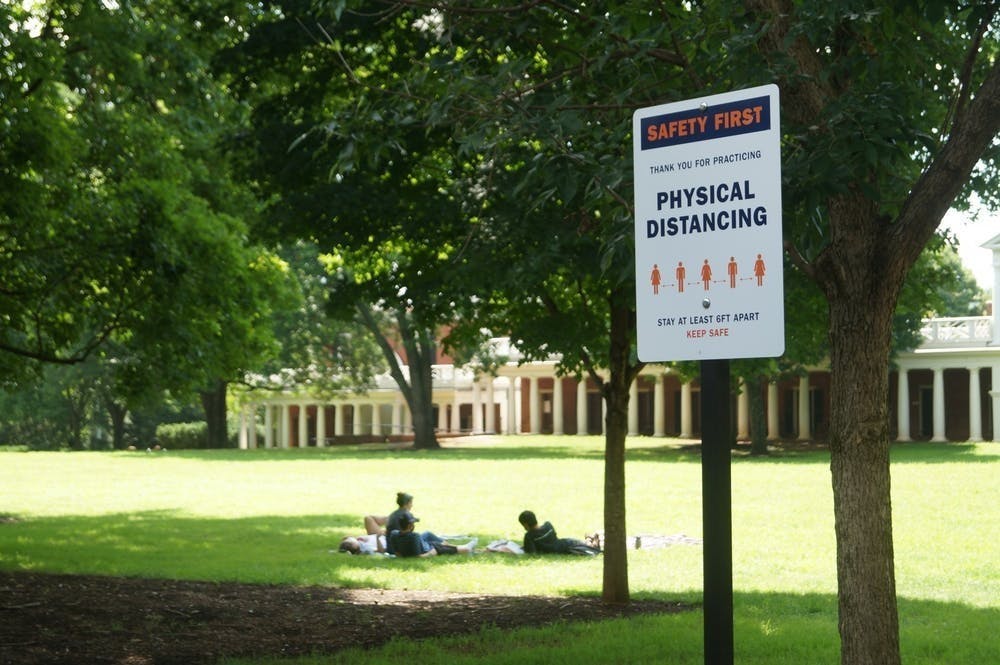Students have had to adapt to a new normal in all facets of University life, from classes and clubs mostly operating over Zoom to watching home football games from a social distance at Klockner Field. Social gatherings have been forced to adjust, too.
While there are still students packing into bars and restaurants on the Corner, the pandemic has meant that more students are choosing to take their gatherings outside this fall, whether to the Lawn, University-provided tents at Observatory Hill or the Old Dorms Quad. While the University would prefer people gathering outside to inside, student behavior sometimes does not align with administrative expectations.
“We have seen outsized gatherings on the Lawn, in the tented areas outside O’Hill dining hall and in the McCormick Quad, and in a few on and off-Grounds residences,” University spokesperson Brian Coy said. “We have worked quickly to address the non-compliant behavior in each case.”
To some students, what exactly defines non-compliant behavior is not always straightforward. The University announced earlier this month that it would continue heightened COVID-19 restrictions for two additional weeks, including the five person limit on in-person gatherings. However, the limit in some spaces has been even less than that.
“I was personally sitting at the Lawn one day at a table under the tents and we were, four of us, wearing masks sitting at a table,” third-year College student Hiam Baidas said. “An Ambassador asked one of us to move because I guess the restriction was three people at a table, even though there’s the five person rule.”
RMC Events Ambassadors have been the personnel most regularly enforcing COVID-19 restrictions, though Coy noted that “they do not have any enforcement authority.” Instead, they are designed to be “highly visible and proactive” in ensuring safety around Grounds and in Charlottesville.
With respect to social distancing guidelines, their role is to “educate and encourage compliance.” If students still refuse to comply, the Ambassadors have been instructed to call either the University Police Department or Charlottesville Police, depending on the jurisdiction.
Although the onus is often put on the Ambassadors to intervene, Coy reiterated the University’s position that students and other members of the community ought to hold one another accountable for violations that they witness.
“We have asked all members of the University community to engage each other if they see a violation occurring, as immediate, respectful feedback can often be the most effective at gaining compliance,” Coy said. “If a community member isn’t comfortable directly engaging in the moment, we urge them to promptly use Just Report It or the community reporting portal to provide us with specifics.”
First-year College Student Bridget Lee noticed that the Ambassadors and others have been monitoring students not wearing their masks, but that such reminders come off as almost too little, too late.
“I’ve seen security guards walking around the Lawn and telling people to put on their masks. I guess it’s good they’re telling people [to do that], but it only does so much because they were already not wearing them [to begin with],” Lee said.
Baidas expressed concern about what she felt to be a flawed COVID-19 enforcement and containment strategy overall and said she thinks that the University needs to ramp up testing efforts to get a better idea of asymptomatic prevalence in the student population. Yesterday, U.Va. announced that it would begin testing students living in on-Grounds residence halls every nine days or fewer. She also believes that gathering size restrictions are only as effective as their ability to be enforced.
“I don’t think we are addressing the root of the problem,” Baidas said. “We need to have better regulations of off-Grounds housing, which is definitely harder to do, but I know that a lot of the problems with COVID-19 being spread is by upperclassmen who don’t live on grounds being reckless, having apartment parties and going to different places.”
What Baidas feels off-Grounds housing might lack in enforcement mechanisms is more than made up for in on-Grounds policing, in the eyes of first-year Engineering student Miriam Morse.
“I was sitting at the corner of the tent next to O’Hill and there was no one within 20 feet of me, but a guy came over and told me I needed to put my mask on because I wasn’t eating or drinking,” Morse said. “I thought that was a little surprising because I was outside, and there was no one near me. I think the rule about having to wear a mask at all times when you’re outside is a little excessive.”
Students are currently permitted to gather in groups of no more than 10 individuals, an increase from the previous restriction of five.
The University’s Return to Grounds COVID tracker reported 11 new cases of COVID-19 since Thursday. There are currently 56 active cases in the University community. According to the dashboard, there was an average of around seven cases per day last week, including the newly reported positive test results from the weekend — a decrease from the 26 per-day average reported two weeks ago. While the University believes that cases are “leveling off,” Coy said that the heightened restrictions are necessary, and that enforcement will continue.
“Students appear to be complying, although there have been exceptions," Coy said. "We are taking formal disciplinary action against violations we deem willful and significant, rather than a simple mistake.”







